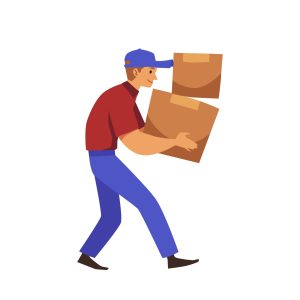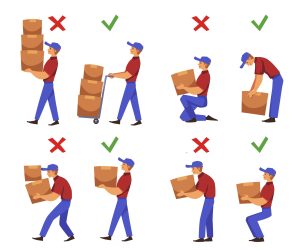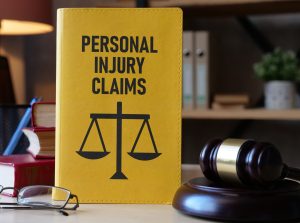In this article, we explore the question, “What are the causes of manual handling accidents?”. Manual handling is defined by the Health and Safety Executive (HSE) as “transporting or supporting a load by hand or bodily force”. The HSE goes on to explain that manual handling includes “lifting, putting down, pushing, pulling, carrying or moving loads”. With loads defined as “objects, people or animals”. The HSE regulates workplace health and safety.
There are various ways manual handling activities could cause an injury. We look at these and ways in which your employer could reduce manual handling risks, including the legislation that guides this. If you suffer an injury because your employer failed to adhere to relevant health and safety laws, you could be eligible to claim compensation. You may like to have legal representation during the claims process. This article concludes with a look at how a solicitor could support you on a No Win No Fee basis.
For further information about accident at work claims, please get in touch with an advisor from our team by:
- Calling 020 8050 2736
- Filling in our claim online form for a call back.
- Ask about how to claim for injuries from manual handling accidents in our live chat.
Select A Section
- What Are Common Manual Handling Injuries?
- What Are The Causes Of Manual Handling Accidents?
- How Can An Employer Prevent Manual Handling Injuries
- Could I Claim If I Have A Manual Handling Accident At Work
- Claims For Common Manual Handling Accidents On A No Win No Fee Basis
- More Resources On Causes Of Manual Handling Accidents And Compensation Claims
What Are Common Manual Handling Injuries?
Before we look at “What are the causes of manual handling accidents?”, you may want to know more about the types of injuries from manual handling incidents that you could sustain. A few examples of the most common manual handling injuries include:
- Back injury.
- Shoulder injury.
- Neck injury.
- Hand injury.
- Foot injuries.
- Muscle tears.
- Sprains and strains.
- Musculoskeletal disorders.
Manual Handling Statistics
Certain workplace accidents that result in specified injuries to employees must be reported to the HSE under the Reporting of Injuries, Diseases and Dangerous Occurrences Regulations 2013 (RIDDOR). As part of their role in monitoring health and safety, the HSE supplies statistics on these injuries, including a breakdown by kind of accident.
In the year running from 1st April 2022 to 31st March 2023, there were a total of 60,645 incidents reported to the HSE. Of these, 10,230 were related to employees who suffered injuries while handling, lifting or carrying.
What Are The Causes Of Manual Handling Accidents?
In answer to your question, “What are the causes of manual handling accidents?” we can tell you that there are various ways in which these incidents could occur across different industries. Some of the ways they happen include:
- Failure to carry out appropriate risk assessments.
- Lack of training.
- Required to lift objects that are too heavy.
- Lifting in an unsafe manner.
- Failure to use mechanical aids, such as a hoist, or your employer may not supply necessary mechanical aids.
- Poor posture while lifting or having to twist and turn your body into unnatural positions.
- Picking up objects from the floor or from above shoulder height.
- Carrying an unstable load and lack of awareness of the centre of gravity.
- Uneven flooring.
- Carrying too many objects at once when the load can be broken into smaller pieces.
- Pushing or pulling a roll cage with too many items stacked in it.
How Can An Employer Prevent Manual Handling Injuries
Whilst you are at work, you should expect your employer to have taken all reasonably practicable steps to ensure your health, safety and welfare. This is their duty of care that is owed to all employees under the Health and Safety at Work etc. Act 1974 (HASAWA).
Your employer must also adhere to the Manual Handling Operations Regulations 1992 if you are expected to carry out any manual handling tasks. Under these regulations, your employer needs to train staff so that they know how to correctly perform their job tasks safely and prevent poor manual handling techniques. The regulations also look at (as far as reasonably practicable) avoiding the need for employees to carry out manual handling tasks involving an injury risk.
Where this is not reasonably practicable, your employer should:
- Carry out a risk assessment. This can help identify hazardous manual handling.
- Take appropriate steps to reduce injury risks to the lowest reasonable level.
- Provide employees who are carrying out manual handling tasks with information about the load weight and centre of gravity.
Additionally, your employer should ensure that any staff member expected to carry out manual handling tasks is sufficiently trained in doing so. By adhering to the relevant health and safety laws, your employer can help prevent manual handling injuries. In the next section, we discuss whether you could claim compensation if you sustain injuries while carrying out work tasks.
Could I Claim If I Have A Manual Handling Accident At Work
As we discussed above, your employer owes you a duty of care while you are at work. If your employer fails to adhere to the relevant health and safety legislation and you suffer injuries as a result, you could be eligible to make an accident at work claim.
However, as part of the personal injury claims process, you will need to prove that your employer’s breach of the duty of care ultimately led to your injury.
For example, if your employer failed to carry out an appropriate risk assessment that would have identified the need for two people to lift an object and you injured your back lifting the item by yourself, you could be eligible to seek personal injury compensation.
If you would like to discuss these eligibility criteria contact a member of our advisory team. They can assess your grounds to claim, and if they are valid, you could be connected to one of the No Win No Fee solicitors from our panel. We explain what No Win No Fee means in the next section.
Claims For Common Manual Handling Accidents On A No Win No Fee Basis
If you meet the personal injury claims eligibility criteria (discussed above) and wish to pursue compensation, you may like to do so with the support of a solicitor. One of the personal injury solicitors from our panel could help with your manual handling claim. Usually, the solictors from our panel offer a No Win No Fee service under a Conditional Fee Agreement (CFA).
Under a CFA, your solicitor:
- Won’t take upfront payments for their representation.
- Ask you to pay ongoing fees.
- Won’t charge for their services if your claim fails.
- Will take a legally limited percentage of your award as a success fee if your accident at work claim is successful.
Direct any questions you have about claiming after sustaining injuries in a manual handling accident to a member of our advisory team. They can discuss the causes of manual handling accidents with you while looking at the specific circumstances of your injuries. If your manual handling claim is eligible, you could be connected to one of the solicitors from our panel.
To discuss manual handling injury claims:
- Call 020 8050 2736
- Fill in our claim online form and an advisor will get back to you.
- Ask about claiming for the most common manual handling injuries in our live chat.
More Resources On Causes Of Manual Handling Accidents And Compensation Claims
The following guides could help you with a personal injury claim:
- Details about filing a compensation claim for a workplace injury.
- Information about making a serious work injury claim and how much compensation could be awarded.
- Guidance on the personal injury claims process and liability.
Here are some external websites that may help:
- Guidance for workers on health and safety from the HSE.
- Information about statutory sick pay (SSP) from the government.
- Details about first aid from the NHS.
If you have any further queries related to your question, “What are the causes of manual handling accidents?” please view the HSE website or if you would like more information about starting a personal injury claim for injuries in the workplace, get in touch with an advisor.





